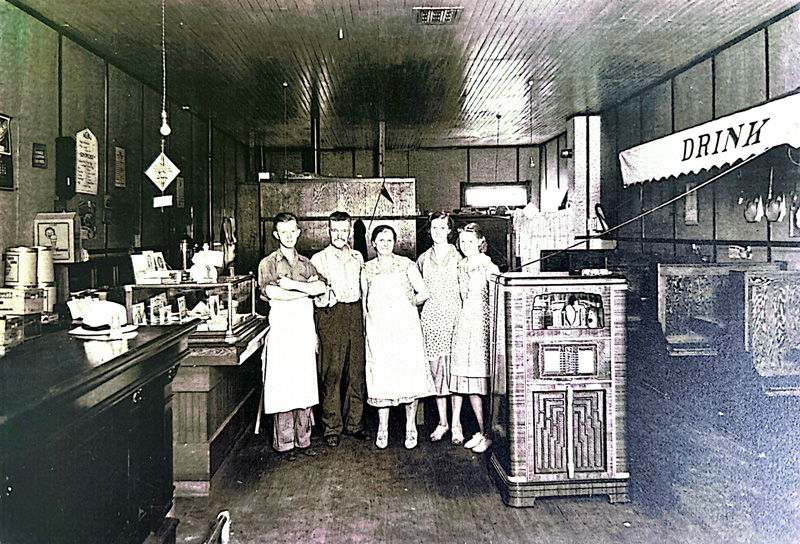Delivering milk all over Spring Grove before school was his first job, earning $2 a week. In 1930, that had the purchasing power that $38 has in 2024. During the Great Depression, many jobs were lost. Any job was better than no job, especially for a schoolboy like Mervin Dvergsten. Although on stage in all the high school plays and musicals, Dvergsten worked many jobs during high school, Class of 1933.
He gave up that delivery job to work alongside his family when his parents went into the hospitality business, renting for $80 per month the Florence Hotel (later named the Ballard House and now the home of Giants of the Earth Heritage Center). Running the hotel and its restaurant provided jobs for several family members, including Mervin’s sister Julia and sister-in-law. His mom Jorgine was the cook assisted by his brother Mike. However, “my folks let me go whenever I had a chance to get a job for a little money,” said Mervin. He worked three nights a week and every other Sunday at the Mobile Station for Clarence Ike. Oh, and before 6 a.m. on those Sunday mornings, Mervin made a couple of extra bucks with a paper route for the Minneapolis Tribune. Most challenging was collecting once a month. “Although it was 10 cents a copy,” he pointed out, “I had a hard time getting my money from some people.”
At the hotel, it was also difficult collecting from the roomers, so Mervin’s parents dropped the lease but remained in the restaurant business. They opened the Dvergsten Café, where His dad Julius, a good singer, was known to randomly burst into song.
On dance nights at the Opera House in Spring Grove, usually twice a week, Mervin and his cousin Orlando Ellingson ran the check room. Once at the Fireman’s Dance, the biggest dance of the year, it was bitterly cold. “I think we cleared $4 apiece,” recalled Mervin. The boys checked so many garments, including many furs, they had difficulty finding space for them all. “I was very worried that somehow, we’d get the coats mixed up, and someone would get away with a fur coat that wasn’t theirs. Never happened, thank goodness.” He also worried about the pot-bellied stove next to the checkroom. “How they got by without a fire in those days.”
They split the receipts with the Opera House (Orlando’s parents, Mervin’s aunt and uncle, Henry and Della Ellingson). However, when the boys also served lunch, they got to keep all the receipts. Mervin’s mom prepared an extra-large roast beef for dinner, giving the boys the leftover beef and gravy for dance-night sandwiches, which Mervin declared “were delicious.”
They paid one cent each for the buns and sold a beef-and-gravy sandwich for a dime, 90% profit. They purchased a kerosene stove for $3 to heat the meat and coffee. “I can’t remember how we cleaned the coffee cups,” pondered Mervin decades later. “We had no running water, and this was before Styrofoam. The pop would be served as is (in glass bottles). In the winter, it was cold of course.”
The boys had a special signal for certain customers. Orlando took the orders at a small counter across the doorway from the checkroom. If there was a couple that looked like they might come back for seconds, Orlando would say “two with,” which indicated for Mervin to be generous with the beef. However, Mervin noted “if it was a guy that was a little drunk, he’d say “one without,” in which case I’d scrape off part of the meat and leave more gravy.”
Mervin was also the chauffeur for the two doctors Helland. One night, they were quite a way from home down near Quandahl in a new Terraplane. The doctor thought the heat indicator showed the engine too hot. When they drove by a schoolhouse, the doc knew there should be a pump there. Mervin went downhill and located the pump – but no bucket. For a substitute bucket, the pipe-smoking physician emptied his tin of Prince Albert. After two or three trips with the tobacco tin, Mervin had the radiator full.
That night as requested, a farmer met the doctor at the road with a team of horses and a wagon. Since the farmer still owed the doctor for previous visits, there was a discussion of payment. “I felt sorry for the farmer,” lamented Mervin. “He must have needed the doc badly to have him come that far at night. Anyway, Doc went with him.”
Another time, chauffeur Dvergsten was summoned to come quickly after an accident on the highway east of Spring Grove. Two girls from La Crosse had lost control of a Model A Roadster and rolled over. The doctor, having already secured a blanket, told Mervin he would have to wrap the victim in the blanket and carry her to the car so that there wouldn’t be blood in the vehicle. “He couldn’t have upset me more!” recalled Mervin. “Anyway, I didn’t need to do anything because the girl was dead.”
The doctors decided to obtain a different car for country calls, “an old 1928 Chevy with knobby tires and chains and a shovel, and you know who the shovel was for!” quipped Mervin. “They called the car Maggie, and she was a pretty good old gal at that.”
Mervin was once called to drive out north of Black Hammer to pick up a lady in labor. Her husband’s car would not start. Mervin got stuck in their snow-covered driveway. After shoveling, he made it to the house but found nobody home. They had walked out to the road where a neighbor had picked them up. Mervin had not recognized that car when they had passed. “I suppose they didn’t recognize Maggie either. Anyway, I was glad the baby wasn’t born in Maggie! When I got back, Doc greeted me with, ‘Where have you been? We delivered a nice baby girl while you were gone.’”
Sources: Thoughts of the Past by Mervin P. Dvergsten, 2005; Interview with Beth Dvergsten Stevens, 2024.

Photo submitted


Leave a Reply